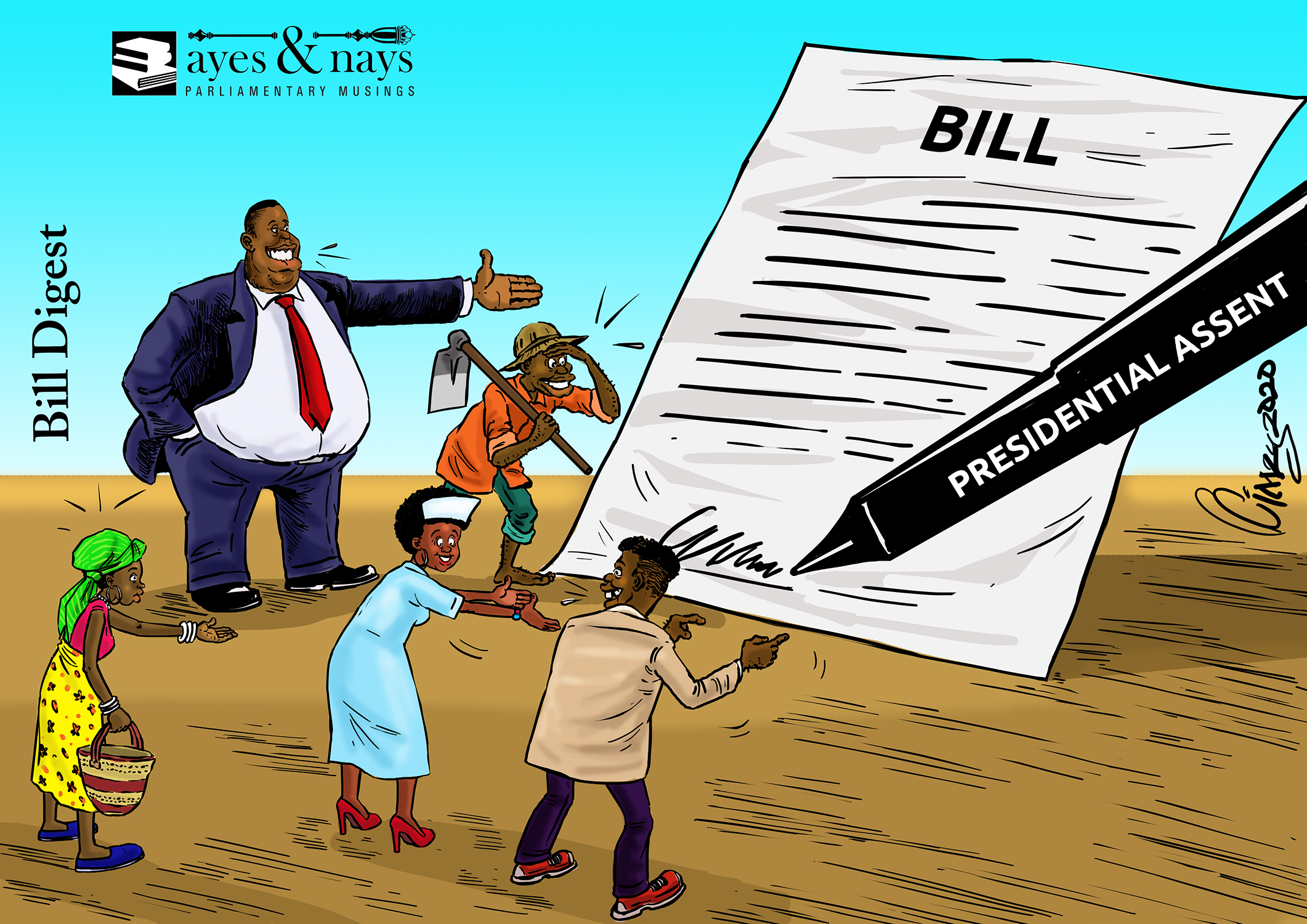
About the Bill
The Bill seeks to amend the Political Parties Act (No. 11 of 2011) It was published on 26th November, 2021 and it was read for a first time in the National Assembly on 2nd December, 2021. The Bill is sponsored by the Leader of Majority Party. The Bill contains 27 clauses.
Highlights of the Bill
We need new names.
Clause 2 of the bill proposes to amend the Act by replacing the definition of “political party” with a new definition; and to insert new definitions of “coalition political party”, “direct party nomination”, “indirect party nomination” and “statement of ideology”.
“Political party” is proposed to be defined to mean (a) an association of citizens with an identifiable ideology or programme that is constituted for the purpose of influencing public policy or nominating candidates to contest elections; and (b) includes a coalition political party. “Political party” has been defined in the Act as one that “has the meaning assigned to it in Article 260 of the Constitution”. In Article 260 of the Constitution, it is defined to mean “an association contemplated in Part 3 of Chapter Seven”. This takes us to Article 91 of the Constitution that provides for the basic requirements for political parties.
The definition “party primary” is proposed to be deleted. It is defined in the Act as “the process through which a political party elects or selects its candidates for a forthcoming general election or for a forthcoming by-election”. One can deduce that the reason why the definition is proposed to be deleted is because there is proposed insertion of new definitions “direct party nomination” and “indirect party nomination”.
Come to my office. I got some work for you.
The roles and functions of a political party have not been provided for in the Act. The Bill therefore seeks to provide for this in clause 3 through the proposed new section 4A. It therefore provides that a political party may recruit and enlist members; nominate candidates for elections; promote representation in Parliament and county assemblies of women, persons with disabilities, youth, ethnic and other minorities and marginalized communities. It also provides that a party may sensitize the public on the functioning of the political and electoral system; promote and enhance national unity; mobilize citizens into participating in political decisions; solicit and articulate public policy priorities as identified by its members; and shape and influence public policy.
Reservation of a name, slogan and symbol by a political party for 90 days.
Clause 3 also proposes an insertion of a new section 4B. It provides for reservation of a name, symbol and slogan for a proposed political party. It provides that the the Registrar shall reserve the name, symbol or slogan in respect of the applicant for 90 days. The Registrar will be required to notify the applicant in writing of the availability of the name, symbol or slogan within 14 days of the application.
After reservation, wait for Registrar to notify you. Then apply for provisional registration.
Clause 4 proposes to amend section 5 of the Act (Provisional registration of a political party) to provide that an application for the provisional registration of a political party shall be done after the reservation of a name, symbol and slogan and most importantly after receiving a notification by the Registrar of Political Parties (received within 14 days of lodging the reservation). If one does not apply for a provisional registration, the reservation of the name, symbol or slogan of the proposed political party shall lapse.
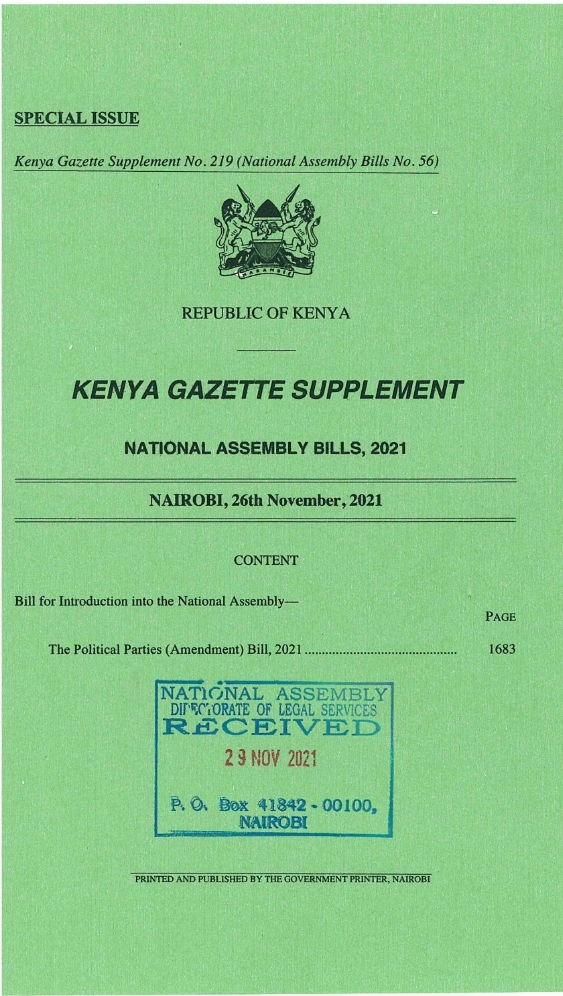
Got certificate of provisional registration? Your grace period has increased from 180 to 270 days to apply for full registration.
Clause 4 of the Bill also amends section 5(5) of the Act. This graphic representation explains it.
(5) The provisional registration of a political party which has not applied for full registration shall lapse at the expiry of
one hundred and eighty daystwo hundred and seventy days from the date of issue of the certificate of the provisional registration.
Where is your statement of ideology of your proposed political party, sir?
Clause 5 of the Bill proposes to amend section 6 of the Act (Application for provisional registration) to provide that an application for provisional registration shall be accompanied by a statement on the ideology of the proposed political party. This will be in addition to what is already provided for in section (2) of the Act. These are signed minutes of the first meeting of the founding members of the political party; the name of the political party; abbreviation, if the political party wishes to use an abbreviation of its name for the purposes of the Act; a copy of the Constitution of the proposed political party; an undertaking to be bound by the Act and the Code of Conduct set out in the First Schedule; and the prescribed fee.
Section 6(3) of the Act provides that an application for provisional registration shall include a request for the registration of the symbol of the political party. A separate amendment in the Bill affecting this section is to include a slogan so that an application for provisional registration shall include a request for the registration of the symbol and slogan of the political party.
Wait, does your political party have an official website?
Clause 6 of the Bill proposes to amend section 7 of the Act to provide that one of the conditions for full registration of a political party shall include the address of the official website of the political party.
You are a coalition political party? Please come to this express counter to get full registration.
Clause 6 also proposes to section 7 to provide that a coalition political party shall not be required to comply with the provisions of sections 5 (Provisional registration of a political party) and 6 (Application for provisional registration).
It provides that the Registrar shall, upon the deposit of a coalition agreement for the formation of a coalition political party, issue the coalition political party with a certificate of full registration.
It further provides that the governance of a coalition political party shall be in accordance with the provisions of the Act relating to the governance of a coalition and the Regulations made in that regard.
We don’t do that here, sir. You cannot be a member of another coalition.
Still under clause 6, there’s a proposed amendment to section 7 of the Act that provides that a member of a coalition shall not be a member of another coalition.
Got a similar political name with a proscribed group? Your application is denied.
Clause 7 amends section 8 of the Act (Parties with certain names not to be registered). It lists two further grounds for refusing an application for the registration of a political party. These are if the name of the political party, the slogan, the abbreviation of the name or the symbol:
- is similar to, or associated with, a group or association that has been proscribed under any written law; or
- is against the public interest
Of course, there are minor amendments to insert the word slogan that is in the spirit of previous amendments dealt with.
RE coalition political party: You will need to submit your coalition agreement 6 months before a general election.
Clause 8 of the Bill proposes to amend section 10 of the Act to provide that a coalition political party shall submit the coalition agreement at least six months before a general election. Here’s the illustration of the proposed amendments (the bold indicating the proposed insertions):
10.Coalitions
(1) Two or more political parties may form a coalition or a coalition political party before or after an election and shall deposit the coalition agreement with the Registrar.
(2) A coalition agreement entered into before an election shall be deposited with the Registrar at least three months before that election.
Provided that in the case of a coalition political party, the coalition political party shall submit the coalition agreement at least six months before a general election.
(3) A coalition agreement entered into after an election shall be deposited with the Registrar within twenty-one days of the signing of the coalition agreement.
(4) A coalition agreement shall set out the matters specified in the Third Schedule.
Resignation from a political party. Deletion because clause 10 reproduces it with some enrichments.
Clause 9 of the Bill proposes to delete subsections (5), (5A), (6) and (7) of section 14 of the Act (Resignation from political party). Here are the subsections sought to be deleted.
(5) A person who, while being a member of a political party—
(a) forms another political party;
(b) joins in the formation of another political party;
(c) joins another political party;
(d) in any way or manner, publicly advocates for the formation of another political party; or
(e) promotes the ideology, interests or policies of another political party,
shall, notwithstanding the provisions of subsection (1) or the provisions of any other written law, be deemed to have resigned from the previous political party.
(5A) A political party whose member is deemed to have resigned under subsection (5), shall in accordance with the procedure set out in the constitution of that political party, notify the Registrar of such decision within seven days.
(6) Subject to specific provisions of a coalition or merger agreement, subsection (5)(c), (d) and (e) shall not apply to a member of a political party which enters into a merger or a coalition with another party.
(7) A member of a political party may only be expelled from that political party if the member has infringed the Constitution of the political party and after the member has been afforded a fair opportunity to be heard in accordance with the internal party disputes resolution mechanisms as prescribed in the Constitution of the party.
The reason why the subsections are deleted is because they are reproduced in clause 10 of the Bill. One will notice that the principles of fair administrative action have been incorporated in clause 10 where a member of a political party is notified before his or her name is removed from the list of its members. Further, a political party is required to afford the member a fair opportunity to be heard in accordance with the procedure set out in the constitution of the political party.
Fair administrative action before the name of a member of political party is removed from the register of members of the political party.
Clause 10 of the Bill proposes to amend the Act by inserting new sections 14A and 14B. The proposed new section 14A provides for the grounds upon which a member may be deemed to have resigned from a political party. What is new is to be found in subsection (2) of the proposed new section 14A. In addition, the same thread of fair administrative action is to be seen in subsections (3), (4), and (5). You can see it below.
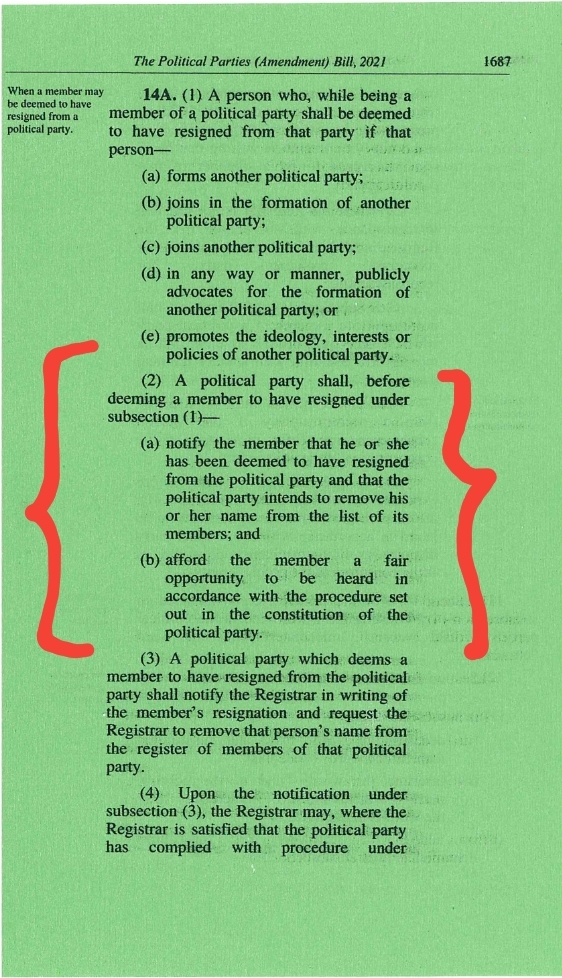
Currently, there’s an assailable section 14 (5A) which provides as follows:
(5A) A political party whose member is deemed to have resigned under subsection (5), shall in accordance with the procedure set out in the constitution of that political party, notify the Registrar of such decision within seven days.
The proposed new section 14B on expulsion of a member from a political party does not introduce something new save to provide for it as an independent clause.
Publication of asset and expenditure declaration in the political party’s official website.
There is a requirement for a political party to submit an asset and expenditure declaration to the Registrar of political parties. The written declaration gives details of all assets and expenditure including all contributions, donations or pledges of contributions or donations, whether in cash or in kind, made or to be made to the initial assets of the political party by its founding members in respect of the first year of its existence.
Clause 11 proposes to amend subsection (4) of section 16 of the Act to provide that the Registrar shall cause the declaration to be published in the political party’s official website apart from its publication in the Gazette and in at least one daily newspaper having nationwide circulation. The illustration of the amendment:
(4) The Registrar shall, within thirty days after the receipt of the declaration required under subsection (2), cause the declaration to be published in the Gazette and in at least one daily newspaper having nationwide circulation and in the political party’s official website.
Notification of changes and alterations affecting political party. Do it in one newspaper, not two. And publish it on political party’s official website.
Section 20 of the Act provides that where a fully registered political party intends to change or amend its Constitution; its rules and regulations; the title, name or address of any party official; its name, symbol, slogan or colour; or the address and physical location of the head office or country office, it shall notify the Registrar of its intention and the Registrar shall, within fourteen days after the receipt of the notification, cause a notice of the intended change or alteration to be published in the Gazette. Under subsection (2), it provides that the political party giving notification shall publish such notification in at least two daily newspapers having nationwide circulation.
Clause 12 of the Bill proposes to amend section 20 of the Act to provide that the notification of proposed changes or alterations shall be made in one newspaper with a nationwide circulation instead of two newspapers, and in the political party’s official website.
On objection to proposed change, amendment or alteration affecting a political party.
Clause 12 of the Bill further proposes an insertion of new subsections. The first limb provides that an objection to the proposed change, amendment or alteration shall be dealt with in accordance with the constitution of the political party and the political party shall inform the Registrar of the manner in which the objection was dealt with. The second limb provides that where the Registrar is satisfied that the political party has complied with the provisions of the section, the Registrar shall within fourteen days after the notification notify the political party in writing that the change, amendment or alteration has been made to the constitution of the political party.
Fair administrative action in suspension and deregistration of a political party.
Clause 13 of the Bill provides for the amendment of section 21 of the Act to address the following:
— To correct the marginal note that does not capture the aspect of suspension of a political party
— To extend the grounds for deregistration of a political party in subsection (1) to suspension of a political party
— To provide for fair administrative action before a registered political party is suspended or deregistered i.e. notice of contravention requiring redress by political party within 3 months
— To provide that suspension of registration of a political party for a period not exceeding 1 year failure to which the party is then deregistered
— To provide that a political party may apply to the Registrar for review of suspension (this has to be within 30 days of receiving suspension notice)
— To provide for an appeal mechanism to the Political Parties Dispute Tribunal
Removal of “willful act or willful omission” yardstick that could cause one to lose seat as a MP or MCA.
Clause 14 of the Bill proposes to amend section 22 of the Act (Effect of registration). It redrafts subsection (2) to make the provision elegant and proposes to delete subsection (3) that provides that where the de-registration of a political party is occasioned by a willful act or willful omission of a person who is a member of Parliament or of a county assembly, that person shall cease to be a member of Parliament or of the county assembly.
A tweak in the distribution of the Political Parties Fund: 10% to political parties based on no. of elected representatives, e.t.c
Clause 15 of the Bill proposes to amend section 25 (Distribution of the Political Parties Fund).
Now
— 80%- based on total votes by a political party
— 15%- based on no. of candidates from political party’s elected special interest groups
— 5%- Fund’s administration expenses
Proposal
— 70% (reduction from 80%)- based on political party’s total votes
— 15%- based on no. of candidates from political party’s elected special interest groups (no change)
— 10%- based on political party’s elected representatives (introduced; previously not there)
— 5%- Fund’s administration expenses (no change)
The illustration of the changes below.
25.Distribution of the Fund
(1) The Fund shall be distributed as follows—
(a)
eightyseventy per cent of the Fund proportionately by reference to the total number of votes secured by each political party in the preceding general election;(
aab) fifteen per cent of the Fund proportionately to political partiesqualifying under paragraph (a)based on the number of candidates of the party from special interest groups elected in the preceding general election;and(c) ten per cent of the Fund proportionately to political parties based on the total number of representatives from the political party elected in the preceding general election; and
(
bd) five per cent for the administration expenses of the Fund.
Satisfied two-thirds gender rule? Got representation of special interest groups? Got elected representatives? Then we are sorry: there are no funds.
Clause 15 further provides for conditions for receipt of funding from the Political Parties Fund. It will be particularly interesting to follow how the two-thirds gender rule in the provision will progress in Parliament. This happens against the backdrop of several attempts to pass legislation on the two-thirds gender rule in Kenya’s Parliament. The verbatim text of the amendment below captures it.
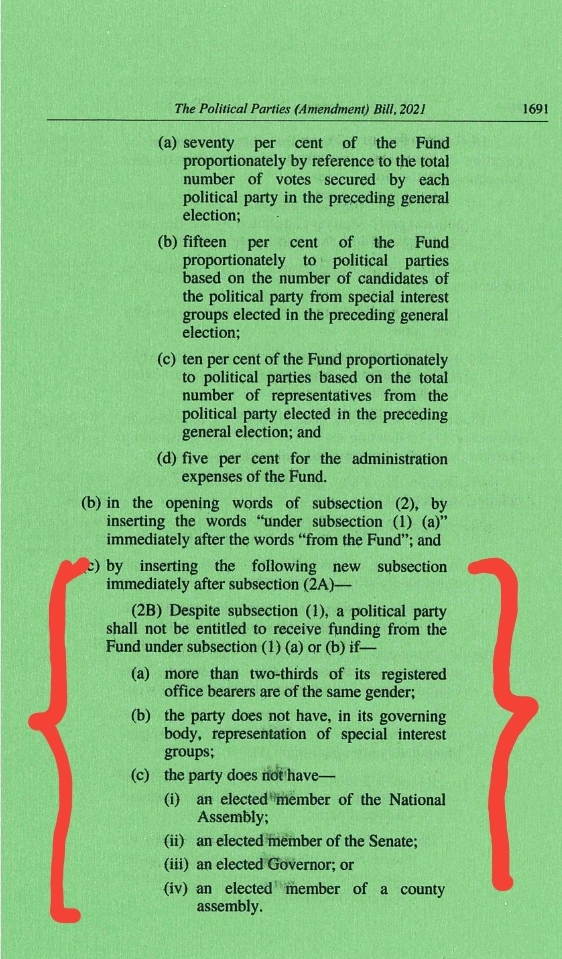
Oh, coalition of political parties, come for your cheque.
Clause 16 of the Bill proposes to amend section 26 of the Act (Purposes of the Fund) to provides that the monies allocated to a coalition political party shall be distributed by the Registrar in accordance with the coalition agreement.
Publish sources of your funds in one newspaper (instead of two). And publish it on your official website too.
Clause 17 of the Bill proposes to amend section 29 of the Act (Publishing sources of funds) to provide that the publication of a political party’s sources of funds shall be made in one newspaper with a nationwide circulation, instead of two, and in the official website of the political party.
Submit your political party’s register of members and statement of your assets and liabilities at least 120 days (and not 60) days before general election.
Clause 18 of the Bill proposes to amend section 30 of the Act (Declaration of assets, liabilities and expenditure in relation to elections) to extend the period within which a political party should submit to the Registrar a register of its members and a statement of its assets and liabilities. The period proposed is at least 120 days before a general election instead of at least 60 days before a general election.
The illustration:
30.Declaration of assets, liabilities and expenditure in relation to elections
(1) A political party shall, at least
sixtyone hundred and twenty days before a general election, submit to the Registrar a register of its members and a statement of its assets and liabilities in the prescribed form.
Political party’s audited accounts not to tabled in the National Assembly.
Section 31 provides for the audit of political parties’ accounts. It provides for the requirement that a political party shall keep proper books and records of account of the income, expenditure, assets and liabilities of the political party.
Clause 19 proposes to amend section 31 of the Bill (Audit of political parties’ accounts) by deleting subsection (3) which provides that the accounts of every political party shall be audited annually by the Auditor-General and shall be submitted to the Registrar and tabled in the National Assembly.
The import of this amendment is that it will not be a requirement for the audited accounts of a political party to be submitted to the Registrar and tabled in the National Assembly. However, a close reading of subsections (4) and (5) reveals that the audited accounts will be submitted to the Registrar. Perhaps the real import then is that the audited accounts will not be tabled in the National Assembly.
More workload for you, Registrar.
Clause 20 of the Bill proposes to amend section 34 of the Act (Functions of the Registrar) to provide for additional functions of the Registrar as follows:
— To keep and maintain a register of members of registered political parties
— To certify that an independent candidate in an election is not a member of any registered political party
— To certify that the symbol intended to be used by an independent candidate in an election does not resemble the symbol of a registered political party
— To certify that the names appearing in a party list are the names of members of the political party presenting the party list
— To regulate political party nominations in accordance with the Act
— To train political party election agents
Proposed establishment of the political parties management information system (PPMIS).
Clause 21 of the Bill proposes to insert the proposed new section 34B which proposes the establishment of the political parties management information system which shall be used by the Registrar for processing political parties’ records for the purposes of the Act. The technology should be simple, accurate, verifiable, secure, accountable and transparent.
More grease to your elbow, Registrar. You can make changes to political parties’ records.
Clause 21 of the Bill proposes to insert the proposed new section 34C bestowing the Registrar powers to make changes to political parties’ records in the following instances:
— Where the application by a provisionally registered political party for full registration has not been granted
— Where a political party has been deregistered
— Where a member of a political party resigns or is deemed to have resigned from the political party and the Registrar has been notified of the resignation
— Where a member of a political party has been expelled from the political party and the Registrar has been notified of the expulsion
— Where a member of a political party dies
— Where a member of a political party has ceased to be a citizen of Kenya
— Where a political party has merged with another political party
— Where the constitution of a political party has been amended, changed or altered
— Where any other event that justifies the changes occurs
Sit upright. This is where you pay attention: party nominations.
Clause 22 of the Bill provides for a new Part on Party nominations. It consists of new sections on political party nominations including methods of conducting nominations; the establishment of structures by political parties for the conduct of nominations; the participation of registered members of a political party in its nominations.
It further provides for the accessing of the register of members of the political party during the political party’s nominations; the procedure for the conduct of direct and indirect party nominations; the vetting of candidates contesting party nominations; and the period within which political party nomination disputes should be resolved by the political party.
You can read the new Part in full below.
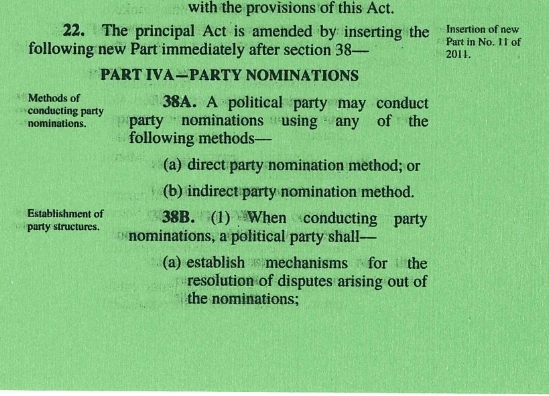
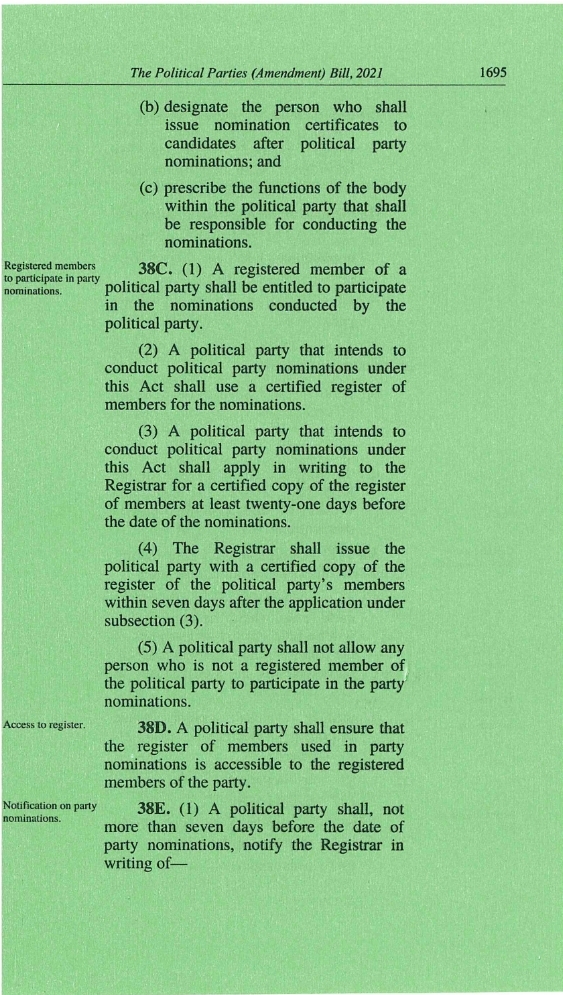
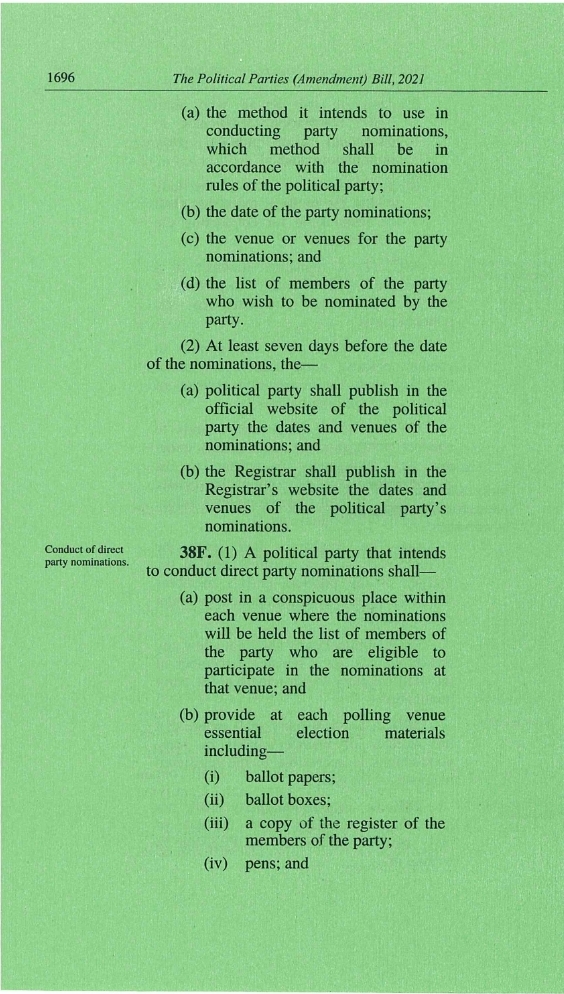
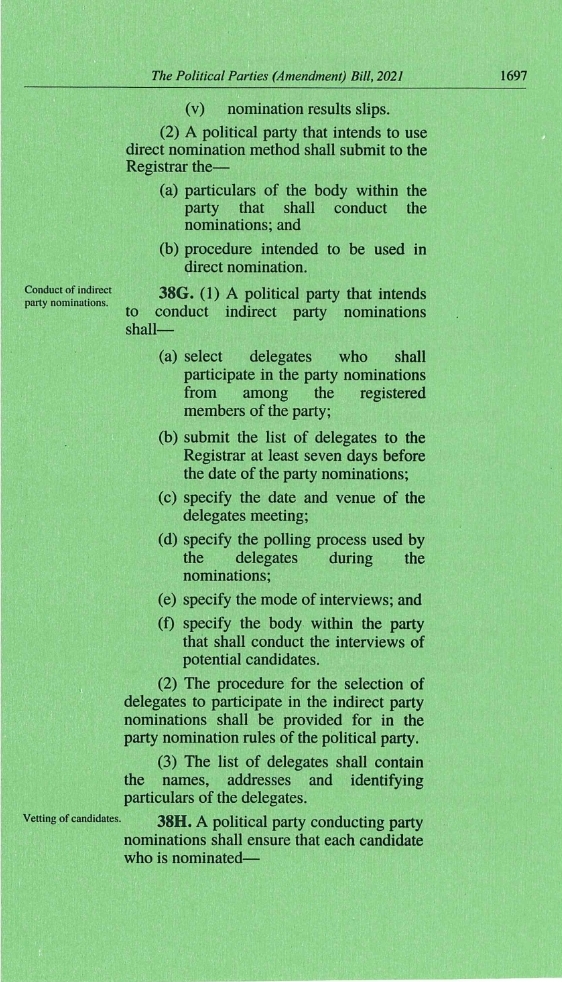
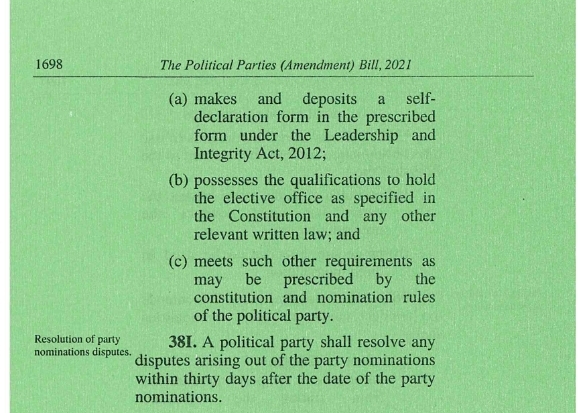
The big guns (read a coalition political party) take their disputes to the High Court— not the Political Parties Disputes Tribunal.
Clause
